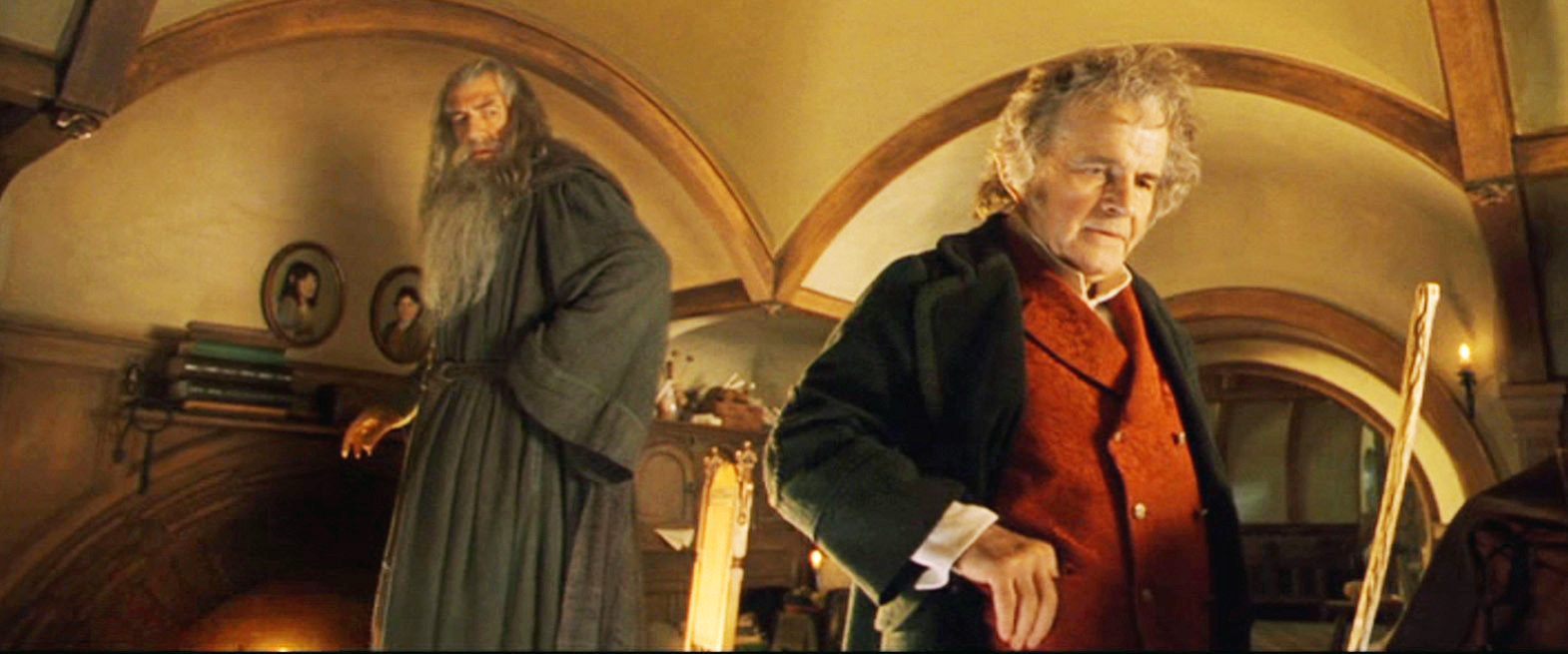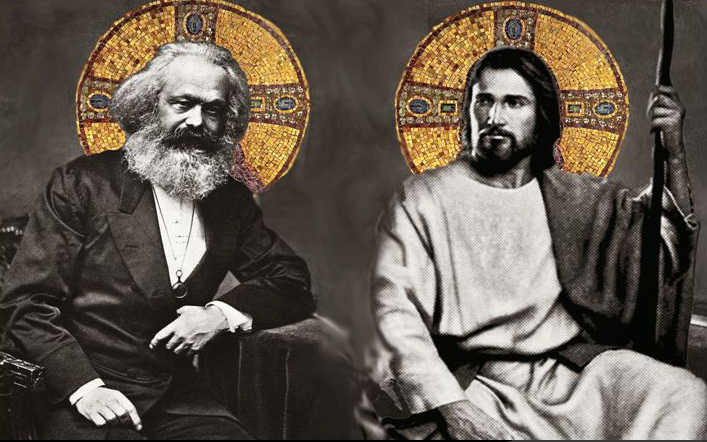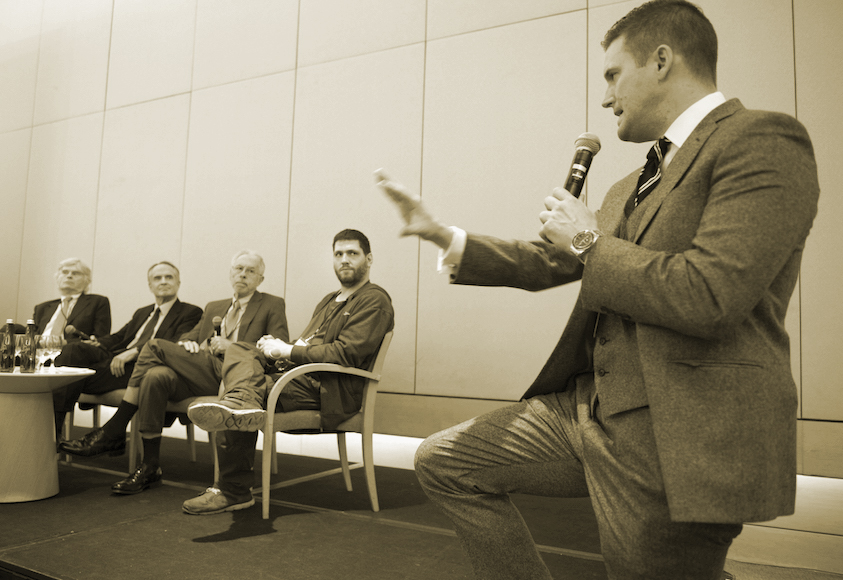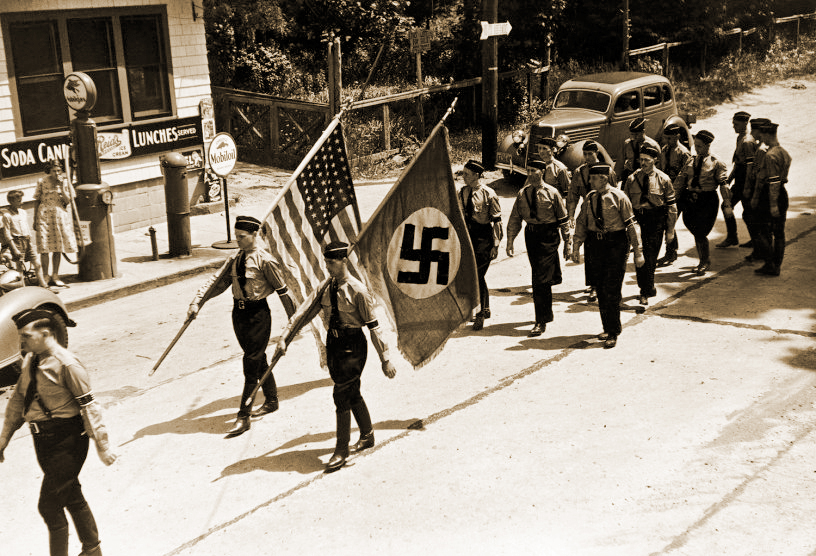
This original canvas signed by Antonio Zucchi (1726-1795) is a landscape in Flemish style, now very near from the desk where I work for this blog.
My friend Jake F. interviewed me last year. These are his words: “The below text is of a scripted interview I was to conduct with C.T. of The West’s Darkest Hour. Due to unforeseen circumstances we could not record. However, Cesar graciously offered to allow this interview to be published on The Right Stuff”.
Jake: Hello, and welcome to Manifest Destiny! This is Jake and I’ll be your host today. I have the privilege of bringing you a rare interview with C.T. of The West’s Darkest Hour. What Cesar brings to the table is rare combination of principled fearsomeness and refined sensibility. This interview will serve as an exposition and clarification of his thought for an unfamiliar audience. Questions and answers were composed in advance for purposes of clarity. As always, thank you for listening and enjoy.
Cesar, please give us a brief overview of your background and journey to your present ideological positions. Which books, authors, films, and music inspired you?
Cesar: Thanks for having me here, Jake. I’ll answer straight to the point.
Both of my parents were artists but since my middle teens they became abusive as hell, and I was the target of this abusive madness, which of course destroyed my young life. I explain the tragedy in two books, Hojas Susurrantes and the one I’ve just finished, Exterminio. Both comprise almost half a million words and soon I’ll start the third of the trilogy. As a matter of fact, my sister died this year. In my latest book I claim that her death was probably related to the trauma we endured in our teens.
With my books, I believe, I’m starting a new literary genre. If I manage to finish the third one I will be the first writer in history who analyzes his extremely abusive family in a million-word trilogy.
As to which books and films inspired me, I’d say that 2001: A Space Odyssey exerted a major influence since I watched it in 1968. I was 10 years old then. It was before the abuse at home. After my family became so destructive, Childhood’s End by Arthur Clarke made a huge impact in my life. Still later, the books of Alice Miller helped me to understand my evil family.
With regard to music, since I was a small child I listened to Mussorgski and Stravinsky. Mussorgski’s Dawn over the Moscow River was my first love. Later I discovered Beethoven.
Jake: You seem to be heavily influenced by psychohistory. Could you briefly define it for our audience? What insights have you gleaned from it? What faults have you found with it?
Cesar: This is my interpretation of psychohistory: Most adult children of extremely abusive parents become mad. Really mad I mean: like the magical thinking of the tribes since prehistoric times. And there are cultures that are far more abusive than others.
Psychohistory is a term used by the American Lloyd deMause to research child abuse through recorded history. The meta-perspective provided by psychohistory helped me to contextualize what happened in my family. The problem with deMause is that he’s a rabid liberal, some would even argue that he’s a Jew, like Alice Miller. In the only chapter of my trilogy that has been translated to English I try to Aryanize psychohistory away from deMause’s crazy liberalism.
Jake: You make incisive criticisms of psychiatry as a pseudoscientific field which often fails to draw upon or selectively draws upon neurological research. How specifically is it wounding our people? How deeply do such wounds go?
Cesar: Curiously, Kevin MacDonald used to teach child psycho-pathology in the university before his recent retirement. I don’t know if MacDonald knows that psychiatry is an “iatrogenic” profession, which means that psychiatric drugs often cause a much more serious mental condition for the client than the original distress or disorder.
For instance, there are international studies that show that people in third world countries, with few resources to purchase so-called anti-psychotics, fare much better for those diagnosed with schizophrenia. In other words, so-called anti-psychotics are iatrogenic: they only worsen the original disorder. My blog contains scholarly references to support this claim, but it is something you won’t ever hear in the media, not even in the outlets of white nationalism.
One of the things that I find exasperating while trying to communicate with white nationalists is that, in addition to the pseudoscientific racial and gender studies, there are other pseudosciences. Psychiatry is one of them. Nationalists are completely clueless of the fact that this pseudo-medical profession has as much scientific basis as the study of UFOs.
Let me expand a bit on this.
Those plugged in the Matrix believe that schizophrenia is the product of a chemical imbalance. Unplugged dissidents know that mental disorders are not a biomedical condition. A computer analogy is helpful here. Imagine a technician who doesn’t believe in the existence of computer viruses in the software. This guy always tries to fix computers by messing with the hardware. That’s exactly what psychiatrists do: they are in denial of the existence of the “software” in the human mind, so to speak. So they treat every mental disorder as a brain disorder. For psychiatrists, biology is destiny. Trauma does not exist, or is irrelevant. Only the genes matter.
But psychiatry cannot demonstrate any biological marker, genetic, chemical imbalance or otherwise, in any of the major psychiatric disorders. That’s why neurology, which is real science, is separated in the universities from psychiatry, which is not a science but a big, big business.
Also, all pseudosciences present their central concepts as unfalsifiable hypotheses, that is, hypotheses that cannot be refuted through the scientific method. What most people ignore is that psychiatry also presents its main concept, mental illness, as an unfalsifiable hypothesis. This is explained in detail in one of my scholarly articles.
Jake: You’ve written extensively on child abuse and its racial implications. Chiefly, that non-Whites are much more likely to abuse their offspring and much more likely to do it in horrific ways. Besides obvious things (like removing Judeo-liberal media or moving to a Whiter area) what advice would you have for racially conscious White parents?
Cesar: If you have in mind abusive parents, you cannot educate them. They are simply unconscious of their abuse. In my latest book for example I have published my mother’s entire diary. It is shocking to see that throughout her diary, mostly about the 1970s, she had no clue whatsoever that she was driving her children mad.
In an ethnostate it would be possible that the child finds a window of escape from abusive families through the Hitler Youth. But even in an Aryan ethnostate would-be parents should be taught not to abuse their kids. Together with the Hitler Youth, education for young couples that are about to marry is the only way that occurs to me that children won’t be abused in the future.
Jake: In the past, you have discussed a collapse scenario as presenting the best or only chance Whites will have to exercise the Fourteen Words freely. What if the collapse never comes? What do you think about the collapse as a mythical trope for “fringe” political movements or causes?
Cesar: I have referred to psychiatry as a pseudoscience that the average white nationalist is unaware of. But there are other pseudosciences taught at the academia that nationalists also ignore. Another example is Keynesian economics, that presently influences not only the academia but the Federal Reserve and the banking system.
You cannot have a thriving economy by means of the current system of huge debt and huge spending. The United States has a debt of almost 20 trillion and if the Fed starts Quantitative Easing 4 it will dwarf the previous QEs combined. QE, of course, is newspeak for inflation: expanding the currency supply, the paper dollars. Sooner or later the dollar will hyperinflate because of this astronomic expansion of the currency supply.
Those economists who reject the crazy paradigm that rules the financial world predict that the crash will happen in this decade. And this means something like the depression of 1929. But unlike 1929 there are millions of Negroes out there, especially in the big cities. After the financial accident they’ll chimp out, and contribute beautifully to the collapse of the System. By the way, have you seen the Jew-movie Imperium?
There is a movie character, the one that “Harry Potter” betrayed, hehe.☺ Well, with his group this character tries to produce what he calls “The Event”, which supposedly would awaken whites, a big act of terrorism.
In real life this is not necessary. The Event is coming nevertheless. And not from racists like us, but from the blunders of the Fed and the international monetary policies.
If by December 31 of 2020 the crash has not happened I will recognize I was wrong. But what if I am right? Because if I am right you should start obtaining coins of silver, and if you can afford it, coins of gold. Even the commercials of Fox News are advertizing this.
Jake: Nordicism is a particularly loaded term. Who exactly are the Nordic peoples? Are they a distinct sub race located only in certain White countries? Do they form the upper crust in every White society? Or are they something else entirely?
Cesar: In my opinion white nationalism or Altright, however you want to call it, is fake. The real thing is National Socialism. Unlike the Nazis people in the Altright are like the republicans: they have granted amnesty to millions of non-whites from Mediterranean Europe. The Germans of the 1930s knew better: the standard for whiteness is the Nordic type.
A pundit from Barcelona in Spain has developed a new racial classification that clarifies this matter. He basically says that the European race is divided in three primordial races: the European Nordid White (“White Nordid”), the Nordid Central Asian Redhead (“Red Nordid”), and the Near Eastern Armenid. The white race is actually a mixture of two or more races.
So we cannot say, “This person is a pure white” but “This person has a mixture of A, B and C races in such proportions.” With terms like Aryan we designate a mixture between White Nordid and Red Nordid and its mild crossing with non-white Armenids or Mongolids—usually people of Germanic and Slavic origin.
While the ideal white is a White Nordid with a Red Nordid, we cannot say that those whites who have some Armenid or Mongolid genes are non-whites. However, we could say they are non-whites if they contain a few drops of Congid blood, that is, Negro genes; or substantial Armenid or Mongolid blood.
In the new racial classification the phenotype is more important than genetic studies. Therefore, based on phenotype we can say that many of us Meds are not properly white. Some of them are, yes. I’ve seen girls as beautiful and Aryan in Spain as in the Nordish countries. But not in the proportion I’ve seen such women even in Texas. Many Meds are mudbloods, something that the Germans knew very well. So well in fact that inter-marriage between the mudbloods and the Nazis was discouraged.
Since this is a scientific subject, I recommend those who want to understand nordicism to study carefully the most scholarly article in my blog. It’s under the title Gens alba conservanda est, which is Latin for “the white race must be preserved”. Alas, most white nationalists are anti-nordicists. They are still under the grip of the egalitarian ideology that has destroyed the West. Most of them sincerely believe that all whites are created equal.
I would recommend they read William Pierce’s only non-fiction book, Who We Are, to grasp my point. Pierce was not a white nationalist. Like the Nazis he was the real thing. The biggest surprise that the reader will find in his book is that the founding stock of the ancient Greeks and Romans was Nordish, real whites.
Jake: Much like Dr. William Pierce, you postulate a Witches’ Brew (essentially a convergence of catastrophic trends) theory of factors leading to the gradual and sometimes rapid extermination of our race. What ranks near the top that most of our people are missing? Conversely, what are we greatly overestimating?
Cesar: For those who accept the premises of Who We Are it is clear that the main enemy of whites are whites themselves, especially the civilizational decadence that comes from wealth-over-race policies.
I have lived in Mexico more than half a century. Latin-America is very similar to Mexico if you visit the countries to the south of Mexico. What the Spaniards and the Portuguese did in the Americas, mixing their blood since the 16th century, was the product of greed, of lust for gold. It was also the result of the universalist creed of the Catholic Church, which considered the Amerindian women as “souls” to be “saved”.
The Iberians that conquered the continent also brought the Inquisition, which persecuted crypto-Jews. But even in Judenfrei New Spain these two factors, economic greed and universalist Christianity, destroyed the gene pool of the Spanish.
White nationalists ignore the history down the south of the US because it breaks their little narrative. Their narrative is that Jewry is the main factor of white decline. The fact is that there are other major factors beside Jewry that nationalists are ignoring. Christianity is one of them as demonstrated in the history of Judenfrei Spain and New Spain.
Jake: On a related note, you’ve produced a volume of writing on different strains of Counter-Semitism. Could you go into more detail on this taxonomy of Counter-Semitism?
Cesar: The Jewish problem is one the most serious problems of the West. For centuries and even millennia Jews have been a hostile minority in the West. There’s no question about it. Just see how they lobbied for a century to open the gates of non-white immigration into the United States. Just see the role they played in the Holocaust on non-Jews committed by the Bolshevik Jews. Just see who controls the anti-white media and how the kikes have been trying to prevent that whites wake up.
The problem itself shouts for a final solution of some sort. This is an aspect I don’t differ much from white nationalists. We both try to find radical solutions to the problem. We agree on the medicine.
But we disagree on the diagnosis. For me it’s clear that the Aryan problem caused the Jewish problem, and not vice versa. Perhaps the best analogy would be to see the Aryan problem as an HIV virus, and the Jewish problem as an AIDS-related infection like pneumonia. Kill off the bacteria if you want. I won’t complain about Alex Linder’s solution. But if you don’t eliminate the virus, you may still have a Judenfrei society that commits racial suicide, as happened here in Latin America.
It is simply untrue, as Andrew Anglin of The Daily Stormer recently wrote, that “physically removing the Jews will solve every other problem”. No. Our ancestors removed the Jews from New Spain and just look at the mess that Mexico is today: those ancestors still committed ethnic suicide, and on a continental scale!
Jake: From your research, what are the strengths and weaknesses of Nietzsche’s thought in general and in to furthering the Fourteen Words?
Cesar: No Nazi tract that I know mentions Nietzsche, but Hitler sort of admired him. Before Nietzsche lost his mind in January of 1889 his concept on the “revaluation of all values” was very handy. I use it a lot in my anti-Christian trolling. I’ll talk about this later in the interview.
Jake: Blake asks: In your writing, you refer to temples and priests of the Fourteen Words. Please expand upon these concepts. What would be the vocation and training of such a priesthood?
Cesar: Here we must recall what my Spanish friend Manu Rodríguez told me: We need to create the Aryan community, an ecclesia, which by the way we never had. Ecclesia, you know, was the principal assembly of ancient Athens.
The Aryan ecclesias need to thrive in our towns and cities, Manu told me. Our “priests”, for lack of a better word, won’t be experts in theology but in history, anthropology and Indo-European cultures. A priest of the 14 words must teach the Western tradition to his young pupils.
Nowadays, without money to build temples like those in Greece and Rome, we can only organize barbecue gatherings like those of my favorite character in the movie Imperium, hehe.☺
Jake: Your upcoming work From St Francis to Himmler has piqued my interest. Based upon the title alone, it is reminiscent of William Gayley Simpson’s journey from being an itinerant Franciscan to a fanatical Aryan racialist. To what extent are you familiar with his work Which Way Western Man? What is it actually about if not your own voyage?
Cesar: I have not read Simpson’s journey but From St Francis to Himmler will be the third and last volume of my autobiographical trilogy.
Francis is the most beloved saint for many Catholics. When I was abused by my father, who admired St Francis, as a defense mechanism I developed a sort of piety inspired in this Italian saint. After the abuse, the doctrine of eternal damnation, that I internalized from my father, destroyed my image of a benign God. The spiritual odyssey from my adolescent piety, to Himmler’s exterminationism, will be the axis of my last book. It is exactly that: an odyssey; the story of a long, long night of my soul.
Jake: For you, White Nationalism was merely a stepping stone to a much sterner and more disciplined National Socialism. Many American White Nationalists enjoy National Socialist iconography and pageantry, as well. What is the line of demarcation between these two ideologies? Is White Nationalism even an ideology or could it more accurately be described as a sentiment? How can American Whites steeped in republican, individualist beliefs adapt to a more “collective” or duty-oriented belief system? What about National Socialism is non-essential or merely adapted to Germanic norms? Finally, which National Socialist texts are American White Nationalists missing or refusing to read?
Cesar: Instead of responding question by question let me say that the line of demarcation is what George Lincoln Rockwell did: he formed a fascist party. White nationalists don’t do anything of the sort! If Rockwell had not been assassinated, radicals like Dylann Roof would have found a warm home and a healthier way to channel their hatred.
Individualist Americans will radically change, and I mean radically, when the convergence of catastrophes is already under way: something that will happen in the second half of the century. I refer to the tectonic-plate, apocalyptic convergence between energy devolution and a political crisis in the West. That collision will create a real mountain.
If “Our race is our nation” then, theoretically National Socialism is doable among Anglo-Saxons, not only among Germanics. Rockwell saw this clearly and he was right.
The most important book to awake whites is the one that Tom Goodrich wrote: Hellstorm: The Death of Nazi Germany. I believe that any honest white liberal who reads it will break, in his mind, the media narrative about the Second World War. Once you nuke the media narrative, I would recommend a Nazi textbook for young readers, Faith and Action by Helmut Stellrecht. It is available online.
Jake: Blake asks: Many White Nationalists advocate the creation of an ethno-state or ethno-states for White-Aryans to seek refuge in. They often fail to mention whether this goal is their highest aim or merely a tactical one. Assuming White-Aryans had the capability to do with the Earth as they wish, what should they do? You’ve been called quite a few names for suggesting that Earth should be made a Whites-only planet. How do you respond to this?
Cesar: I don’t remember the names I was called. Perhaps I missed those threads? In the book that I’ve just finished, Extermination, I explain why the human race is a failed species. Most of them deserve extermination, save the most beautiful Aryans with good heart for nature, the children and the animals.
Extermination is a subject that has only been partially explored in fiction, at the end of The Turner Diaries. It is time to speak out in the genre of non-fiction, as I just did with my latest book, which will be available in Spanish this month or the next one.
I had said that I was inaugurating a new literary genre. But I omitted to mention that, if completed, my trilogy goes well beyond such autobiographical genre into a philosophical system. From this point of view, exterminationism is more than an odd subject: it is what we may call the Significant A of the coming Overman. But let’s change the conversation to a more “normal” subject.
Jake: Rock music is controversial within racialist spheres. You take an uncompromising stance against it for a host of reasons. Two that come to mind are its negro roots and repetitive notes. But, rock has been so heavily appropriated by Whites that even negroes flee from it now. At what point does White ownership (in terms of content; we know Jews dominate the music industry) erase a genre’s origins? Is this even possible? Are there any healthy modern White music genres? Many would defend folk and electronic music as the latest resurgence of authentic White culture in music. Do you agree? Finally, which classical composers or performers would you suggest to a modern White wishing to expand his or her tastes?
Cesar: Folk music is OK but not what the Nazis called “degenerate music”. Even nationalists have been unable to recognize that such music is used by the System to degrade the spirit of whites, to control them. A passage from 1984, written before the birth of rock, was prophetic. The music in the totalitarian world, Orwell says: “had a savage, barking rhythm which could not exactly be called music, but resembled the beating of a drum… The proles had taken a fancy to it.” Of course, the people of the Altright would be degenerate proles from the Nazi point of view: they listen so-called Retro-wave music.
As to which classical composers, I’d recommend starting with Walt Disney’s 1959 movie Sleeping Beauty. Its soundtrack contains a masterful edition of the music of Tchaikovsky’s ballet. But the trick is not adding classical music to your repertoire. The trick is subtracting degenerate music from what you listen.
I have always compared degenerate music with degenerate sex. A guy just cannot have a healthy marriage with a lovely wife and children and, at the same time, indulging himself in escapades in gay bars. The degenerate side of both sexual lifestyles and music tastes must be completely cut off from our way of life.
Jake: On several occasions you’ve described the Sublimis Deus papal bull as the original sin committed in South America. Could you give us some background on this proclamation? Was it a logical extension of Christian doctrine or an aberration?
Cesar: It was an expansion of the Church’s universalism, where all races can enter the church. “Catholic” in fact means universal. But the original sin was not the Pope’s bull. The original sin of the Spanish and the Portuguese was, as I said, the lust for gold and silver in Mexico and Peru. The Catholic bull that allowed Iberian whites to marry the brown natives was a very serious, mortal sin; but not the original one.
Jake: Lately, the phrase “Pathological Altruism” has been used to describe a weakness of the White-Aryan psyche. Is this valid and sufficient? Do you agree with Dr. Sunic and Pierre Krebs that a universal Christian memeplex is the source of our vulnerability, instead?
Cesar: I don’t know much of Krebs but Sunic is quite smart. He does not only blame Christianity as a more elemental factor of white decline than Jewry; he actually says that capitalism is the main factor.
I believe he’s right. And I must add that Americans love Mammon too much to purge the Jews! Once more, the Aryan problem has created the Jewish problem. Pro-whites must read Who We Are to contextualize historically the claim that wealth-over-race policies is suicidal, even when no Jews are present. March of the Titans by Arthur Kemp also reaches the same conclusion.
Jake: Blake asks: How do we as a race combat our predisposition to choose wealth over a sound society? Alain de Benoist notes that critics of immigration must also critique capitalism lest they contradict themselves. What must be done to slay Mammon once and for all? Or, at the very least, restrain him?
Cesar: Mammon will die in this century of natural death. I not only believe that the financial collapse is coming this decade. I also believe in peak oil and energy devolution later in this century. Once oil is depleted, corporate capitalism can no longer be the economic paradigm for whites, especially after the racial wars change bourgeois whites into blond-beast warriors.
The paradigm of the future lies in farming. Using an image of the penultimate chapter of The Lord of the Rings, I would say that the new paradigm lies in a return to the bucolic Shire. By the way, that very important chapter, “The scouring of the Shire”, was not filmed in Peter Jackson’s version of The Lord of the Rings. In the book, which I read, the war at the Shire actually happens after the One Ring has been destroyed. The ring is metaphor for gold…
Jake: What are your thoughts on the so-called manosphere? How should Aryans approach courtship in a day and age where it’s too early to procure Sabine women yet too late to find a young woman that isn’t a pod person? On a related note, how should White-Aryans answer the homosexual question?
Cesar: A lot of what is said in the manosphere is true. I’ve started to elaborate a guide for the priests of the fourteen words. He should not discuss with Jews, non-whites or women. He should even try to avoid talking with white Pod women.
Recently I discovered a YouTube blogger, Turd Flinging Monkey. I was shocked to learn about scientific facts that concern all white males that I didn’t find in the more formal writing of Roger Devlin. Yes: Turd Flinging Monkey is an anti-racist, clueless blogger about the Jewish question. But there’s something in his manospheric rants that merits scrutiny. After I finish the corrections of my book I’ll see all of his videos.
Courtship is impossible for the moment except if you move to an Amish or Mennonite community. So what can we do before the collapse of the rule of law, a rule that prevents Aryans from abducting and raping the Sabine women? The blogger Turd Flinging Monkey simply recommends masturbation. Well, well…☺ I prefer to be a workaholic to avoid thinking in sex.
As to homosexuality, it is a pity that some open homos in the Altright are not ashamed of talking publicly about their degeneracy, as if it was normal. Shame on them.
Jake: Unlike most pro-Whites, you stand by Heinrich Himmler with few reservations. What can we learn from him? How does he stand in relation to more “mystical” figures on the Right like Spengler or Yockey?
Cesar: I know almost nothing of Spengler except that he refused to support Nazi ideas of racial superiority. Yockey was a great essayist but the style he chose for his famous book, the very one which gave the name to the recent film Imperium, is too philosophical for my taste.
What I like of Himmler is that he volunteered to do the dirty job, extermination. I identify with Uncle Heinrich because, like him, I don’t look Aryan. But when he visited a specific town in Norway he admired them so much because of the purity of the Aryan breed there.
I believe that later in this century, when the demographic bubble pops as a result of energy devolution, Himmler-like exterminationism should become the religion of the Blonde Beast. Only the best should survive. I envision throughout the Earth the beauty that Hitler and Himmler saw in specific Nordish towns, a return to the Shire so to speak after the death of capitalism.
Here comes handy Nietzsche’s concept about the transvaluation of all values. Remember that I call atheists “Neo-Christians”. When millions of adolescent whites change their T-shirts from Che Guevara to Himmler, you will know that the race is already saved. I can only hope that my books will help young whites to revaluate their fucking values.
Jake: Are pro-Whites approaching the subject of Holocaust revisionism correctly or incorrectly? How should it be approached and why?
Cesar: Incorrectly. One must start with the Holocaust committed by the Allied forces. I sincerely believe that any nationalist who has not read the abridged edition of Alexander Solzhenitsyn’s The Gulag Archipelago and Tom Goodrich’s Hellstorm is a historical fool.
It is not only that after the Second World War the Germans were dishonestly demonized. The biggest secret of our times is that the astronomic crimes of the Allied forces dwarf what the Germans did. What the United States and the Soviet Union did in times of peace was more monstrous than the crimes attributed to the Germans in times of war—precisely because the Allied Holocaust was perpetrated in times of peace! I am talking about the crimes committed by Eisenhower and the Soviets from 1945 to 1947. Most people are unaware of this Holocaust. I would dare to say that if whites do not atone for the genocide perpetrated on the German people they will go extinct.
The root problem of white decline is Christian meta-ethics, what I have been calling “Christian axiology”. National Socialism revaluates such meta-ethics back to the mores of the ancient Greeks and Romans. This cannot happen as long as whites are Christians and neo-Christian atheists.
When the Aryan race reaches maturity, probably in the next century, the calendar must be changed from Jesus to Hitler. Anno Domini will start with the Fuhrer’s birthday, not with the crucified rabbi. White nationalists are incapable to reach this level of priesthood today because they are part of the problem as well as part of the solution.
Jake: Looking North, what are your thoughts on Donald Trump and the Alt-Right? What advice do you have for the average Alt-Rightist? What ideological pitfalls should he avoid that we haven’t already discussed?
Cesar: Alt-rightists might have their 15-minute fame after Trump wins. But when things get really nasty after the dollar collapses the proles will look after more masculine voices, those filled with hatred. Real hate I mean. Not the VDARE, American Renaissance or the Radix Journal types but The Daily Stormer, Neonazi types.
Jake: What is it like being a White or Aryan Man in Mexico? What has been lost in Mexico’s de-Europeanization process? Can the average “race-neutral” or un-awakened American White fathom what a majority colored country is like day in and day out? More broadly, what do we have to lose that we don’t know we have to lose?
Cesar: Recently Donald Trump visited my own town, Mexico City. But Latin America, not only Mexico, is too far gone. Nothing can be done here down the South. You guys have half a century of polluting your blood but there are still millions of pure whites in North America. Here down the south these guys have half a millennium of mestization, and in 500 years no intellectual voice has ever been raised against this genocide of Iberian whites! I can speak volumes on the subject but a single anecdote will be enough.
Recently, a meeting was organized by my former classmates of the Madrid School in Mexico that graduated forty years ago. This was a school founded by those who fled from Francisco Franco after the civil war. Two of my whitest schoolmates, blond and very handsome four decades ago, married mestizo women and formed mestizo families. I was shocked! Presently the young students of the Madrid school, who used to be mostly white in my teens, have become brownish. The second generation! Almost all white Latin Americans have already become Body Snatched Pods. Even Argentina and Uruguay are gone.
In the US you at least have Fox News. In Spanish-speaking countries, Spain included, there’s not even one media outlet that sides Donald Trump. Nothing! What remains of Iberian whites are like Jeb Bush: they’re happily marrying dwarf Latinas. Our only hope is that a tough ethnostate is formed at the North and then proceeds to conquer so-called Latin America.
Jake: Where can our listeners find your work online? Where can they purchase your books? What parting message do you have for our listeners?
Cesar: They can google “chechar” (that is, c-h-e-c-h-a-r) and “WordPress” and they’ll hit a blog, “The West’s Darkest Hour”. My books are linked at the top of my blog.
My parting word is simple: I am not a white nationalist. I am a guy to the right of Himmler. Only one of my books is in English, Day of Wrath that I dedicated to you. Since it will take some time for the rest of my books to be translated to English, read instead William Pierce’s books and see for yourselves how an American also rejected Christian ethics.








